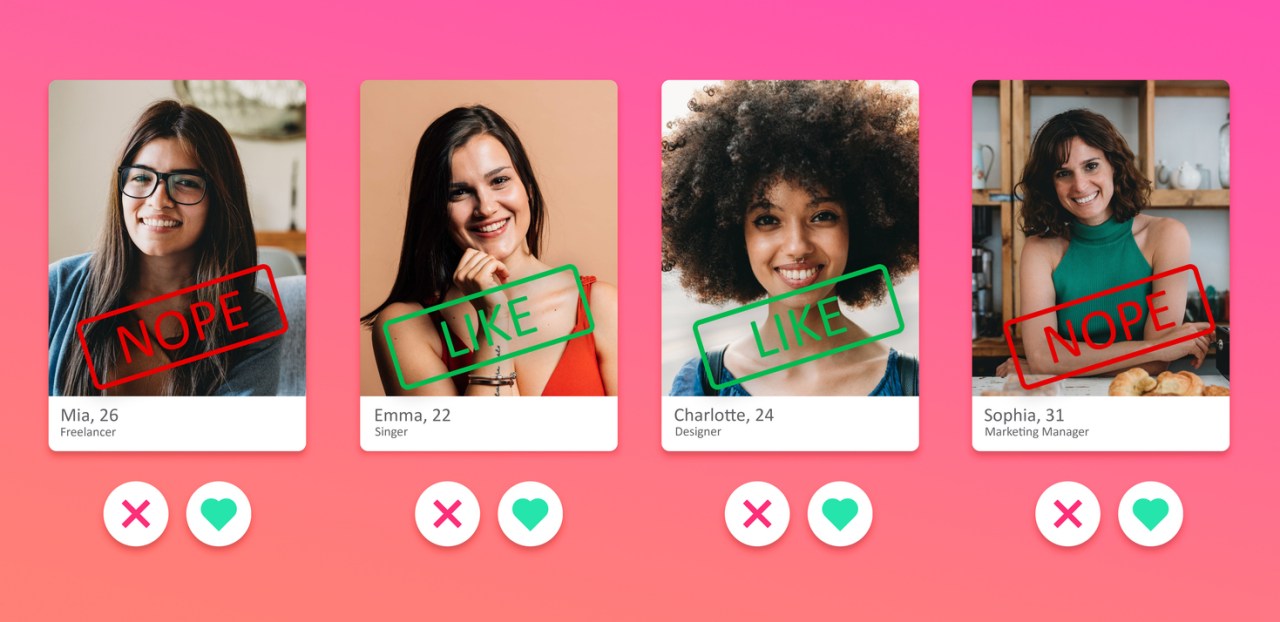It’s 30 years since a website called Match.com opened the Pandora’s box of online dating. Until then, with the tiny exception of the classifieds, meeting a mate had to begin out there and in person. But from 1995, dating retreated to a desktop computer – a virtual shop window of real people. Match.com was launched as a minimum viable product that sold, so said the wags, other minimum viable products. Today, the online dating industry makes more than $9 billion. By 2033, its revenues are expected to double.
There are now tons of apps, yet still so many loners. According to one survey, 44 per cent of Londoners are single. If Pandora’s box opened years ago, today it’s surely shattering. Dating apps, says feminist author Louise Perry, are great fun for a certain type: the socio-sexual (man). Players, to you and me. Bumble, Tinder and the rest have enabled these cads to clean up. We’re talking multiple dalliances per week, sometimes per night. Everyone else, meanwhile, good luck.
For men, the apps conspire with our cowardice to relieve us of the mission of having to ask a girl out in the flesh. For women, it’s even worse. By their thirties, most want marriage and children, so need their date to commit. But the all-you-can-eat buffet of apps, swipes and matches is hardly a recipe for making one-woman men out of thirty-something man-children.
As a 37-year-old man, I can just about recall a time when a date was a special occasion. One you might have dared to dress up for and certainly looked forward to. But in 2025, a date is barely a notch above an errand. Less romance in the air, more the stink of inconvenience. That’s if the thing isn’t cancelled at the last minute.
If it does go ahead, all the lies might make you wish it hadn’t. We all have to pretend on dates that we’re not the arrogant, underachieving, flatulent pigs known to our friends and exes. But the apps encourage these deceits. Photos that flatter (and filter) us. Bios that flog our good traits, while forgetting our bad. All redrafted with the wit of the raconteur you’d like to be but aren’t. What LinkedIn does for our professional lives, Hinge accomplishes for our love lives. Good for our egos, perhaps, but hardly a sound foundation for a relationship.
Because here’s what no dating profile ever tells you: up close, we’re all deeply, deeply flawed. Alain de Botton, married 22 years, has a suggestion for new couples: ‘Ask each other on an early dinner date… “How are you crazy? I’m crazy like this, how about you?”’ Gulp. Except, there’s also solidarity in the candour. One that takes the edge off and laughs at each other’s expense.
Swipes and matches is hardly a recipe for making one-woman men out of thirty-something man-children
Like so many features of the internet, you’d never invent the dating app now, but you can’t uninvent them either. So here’s an idea: a new dating app with a proper point of difference. Let’s call it Worst (in homage to Marilyn’s quip about men who don’t deserve her at her best). Unlike the other apps with their false promises, Worst isn’t in the game of finding your perfect match, but your imperfect one.
Users wouldn’t upload sociable photos, and certainly not one shot by a professional or snapped ten years ago before your hairline bailed. Rather, it would oblige you to add – what else? – your passport photo. As plain and pure as a headshot can be. To go with the photographic evidence, users would list three facts about themselves:
- Worst thing about your appearance – the physical imperfection (you know the one) that you’re most insecure about;
- Worst thing about your behaviour – e.g. control freakery, flightiness, a laugh that sounds like a clubbed seal;
- Worst thing about your character – a ‘This Be the Verse’-level flaw, doubtless inherited, that makes you crazy.
Such an app wouldn’t be immune to porkies itself. But to mitigate against dishonesty, a social proofing feature could let users flag any flaw that was loud and clear on the date yet missing from the profile. But beyond the design of the algorithm, Worst would be about a spirit of truth – giving you permission to fess up to the weaknesses that are horrible to you, but redeemable to someone who inexplicably finds you rather lovely.
In recent years, the share prices of Match.com have plummeted. A dose of honesty might just be what their business models need. A beautiful relationship should start with the ugly truth.








Comments